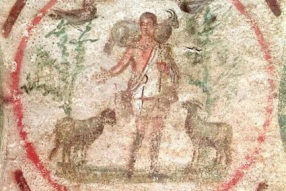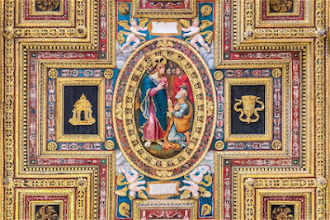The Golden Compass
The following statement was written by Fr Peter Malone on behalf the Cinema Desk of Signis - the World Catholic Association for Communication.
In the ordinary course of events, film releases and film reviews, there would be little call for a statement on The Golden Compass. It is simply the most recent in a spate of fantasy films that have entertained wide audiences since 2001. The Lord of the Rings along with the first Harry Potter led the way that year, with Lord of the Rings sequels in 2002 and 2003. The Harry Potter films continue with the sixth to be released in 2008. Then came Narnia in 2005 (with Prince Caspian scheduled for 2008), the very pleasing The Bridge to Terabithia, followed by lesser fantasies, Eragon and The Dark is Rising. Now we have The Golden Compass. The principal films have noted, even celebrated authors: J.R.R. Tolkein, J.K.Rowling, C.S. Lewis and, now, Philip Pullman.
Actually, it is Philip Pullman who has led to the current controversies and many letters, website and email scaremongering about the film before its release.
But, first a comment on the film itself. This is a statement on the film and the film itself, not the novel 'Northern Lights' on which the film is based, or other Pullman novels - which I have not read. Some observations on Philip Pullman and his ideas will follow.
The Golden Compass is well-made, with a lot of intelligent dialogue, including the word 'metaphysics' a couple of times. Much of the film requires attention as well as some developed vocabulary. It looks very good: sets and design, effects for fantasy, and Nicole Kidman wearing a large array of costumes and gowns. The cast is strong with Dakota Blue Richards as the feisty (non-cute) heroine, Lyra, who, along with her daemon (more about that word later), Pan, who is the external version, the physical manifestation of her 'soul' with whom she can speak and argue, is ready to take on all comers and does. The talented young actor, Freddie Highmore, is the voice of Pan.
The Golden Compass itself is a powerful mechanism that tells the truth and reveals what others wish to hide.
Apart from Nicole Kidman, who seems to be relishing the opportunity to be glamorous, charming and ruthlessly villainous, there is Daniel Craig as Lord Asriel, Sam Elliott, exactly as he is in the many Westerns he has appeared in, as Mr Scoresby and a long list of distinguished British stage and screen actors including Derek Jacobi, Christopher Lee, Claire Higgins, Tom Courteney, Jim Carter and the voices of Ian McKellen (particularly strong and heroic) and Ian McShane (villainous) as the rival bear kings. The film certainly has class. Interestingly (and perhaps surprisingly), writer-adapter and director is an American, Chris Weitz. After assisting his brother, Paul, with the directing of American Pie and the Chris Rock comedy, Down to Earth, they went to England to direct the film version of Nick Hornby's About a Boy. Obviously, things English have appealed to him.
The plot offers, one might say, some variations on most of the fantasy films listed above. Afficionados will enjoy pointing out the comparisons. Yes, there is battle between good and evil and in remote locations like the Rings Trilogy. Yes, there is a young central character, this time a girl, a kind of working class Hermione who lives in a college and has to do Harry Potter-like actions. The king bear, a literally towering figure, is reminiscent of Aslan in Narnia. There is a happy continuity in the imagination of all these films.
With a girl as central and with a number of battle sequences, the film should appeal to its boys and girls target audience and the adults will probably enjoy it too (but may have to ask the children some clarifications of plot and characters).
There are some aspects of the film that may raise a religious eyebrow. The opening of the film speaks of parallel worlds, a feature of all of the best film fantasies. In our world, our souls are within us. In the parallel world, the soul is outside us, in the form of a symbolic animal called a 'daemon' (not a devil but a 'spirit' according to the origins of the word).
The other word is the 'Magisterium', the name of the all-powerful ruling body which is authoritarian and intent on eradicating free will so that all people, especially the children they abduct and experiment on, will lose their daemon and be completely conformist and happy. Science fiction has treated this plot in the several versions of The Invasion of the Body Snatchers. The Magisterium heads are embodied by Derek Jacobi and Christopher Lee who spurn tolerance and freedom and speak of heresy. Magisterium is, in fact, the word used for the authoritative teaching of the Catholic church, so that is clearly a critical element though, as will be quoted later, Pullman says he is not anti-Catholic but anti-rigid and authoritarian religion.
The Golden Compass, normally, would be classified as PG or PG 13, suitable for most with a warning that there are some frightening scenes and battles for the younger audience.
However, the Catholic League For Religious and Civil Rights in the United States opened a campaign against the film three months before its release and published and widely distributed a booklet critical of the attitudes of the author and, by extension, his novels. It is called : 'The Golden Compass: Agenda Unmasked'. The head of the League, William Donohue, has placed critical material on the League's website and has been the guest on several American chat shows. His video except on his site was aired often in television news broadcasts at the time of the film's premiere in countries like the UK. Reporting of the film on ordinary radio news bulletins generally referred to the Catholic League and its campaign. The League and Mr Donohue received enormous publicity.
A number of people in different parts of the world, scenting a controversy or a crusade, or simply out of displeasure at the alleged accusations, are involved in letter-writing, especially emails warning of the dangers of the film, and some personal denunciations.
As with all controversies and campaigns, attack without the benefit of viewing a film undermines the credibility of a crusade whether it is justified or not.
As with the arguments about magic and witchcraft in the Harry Potter novels (though there is little discussion about the magic and witchcraft in Tolkein and Lewis), some parents were alarmed at the upsetting messages they received. Two weeks before the release of The Golden Compass, this letter was emailed. Some paragraphs are included but edited for the anonymity of the writer:
I was sickened to read all the praise for the book which is worse than the movie. I now feel I must let as many people, especially parents, know that the book and movie are disgusting and evil. I feel sick by this horrendous author because I have been chosen by our Dear Lord to bring his wonderful teachings to the little ones and I'm honoured to do it. I'm a Catechist preparing little ones for their First Holy Communion.
I pray that after everyone reads what I have written in our Church news letter, I will get the same support from those in my parish. It was suggested that I write bringing this horror to the attention of as many as I could and to ask for help in anyway to put a stop to this evil being read and seen by our children.
'I apologise for so much anger but the world is bad enough for our children without the likes of this sick non believer and I'm writing to as many people including my Bishop and Our Holy Father.
The Catholic League website indicates that the film has been toned down so that 'Catholics, and Protestants are not enraged'. As indicated, the film does not really raise any direct theistic or atheistic issues or even questions.
The main problem is that Philip Pullman is an 'avowed' atheist (parallel with Tolkein and Lewis being 'avowed' Christians). We live in a pluralist world where Christians can express their good faith beliefs but cannot expect that everyone will agree with them. Those who hold different opinions have a freedom to express them, even an atheist who puts forward views in good faith, so to speak. This can lead beyond fixed stances polemic to dialogue and attempts for a meeting of minds on key issues.
Statements that Pullman has made in interviews and on television on his atheism, his criticism of authoritarian Christianity and his (alleged) desire that children find their way to atheism have offered the impetus for the attacks in print and in a video discussion by William Donohue and the League. His acknowledgement that the film may not be offensive or enraging is followed by concern that children who have not read the books will want to read them after seeing the film and will be put in danger of atheism. (Checking with some respectable Catholics who have read the books, I found that they were surprised to hear this allegation.) Of course, there are others who have asserted and will assert that the novels have this atheistic agenda.
From the League website:
'It is important that all Christians, especially those with children or grandchildren, read this booklet. Anyone who does will be armed with all the ammo they need to convince friends and family members that there is nothing innocent about Pullman's agenda. Though the movie promises to be fairly non-controversial, it may very well act as an inducement to buy Pullman's trilogy, His Dark Materials. And remember, his twin goals are to promote atheism and denigrate Christianity. To kids.'
It is seen as a 'stealth campaign'.
By way of contrast, the president of the American National Secular Society said that in toning down the film, especially concerning the Magisterium, 'they are taking the heart out of it, losting the point of it, castrating it'. (Reference: Christianity Today website)
The director, Chris Weitz, says on this matter:
'In the books the Magisterium is a version of the Catholic church gone wildly astray from its roots. If that's what you want in the film, you'll be disappointed. We have expanded the range of meanings of what the Magisterium represents. Philip Pullman is against any kind of organised dogma whether it is church hierarchy or, say, a Soviet hierarchy.'
To gauge the tone of the campaign, which is couched in aggressive righteous language with some mockery, readers can find a great deal of material on the League website. Typical of the material is this News Release from November 2nd.
On this morning's "Today" show, English atheist Philip Pullman was questioned by Al Roker about his trilogy, His Dark Materials, and the movie which opens December 7 that is based on his first book, The Golden Compass. Roker mentioned that the Catholic League is charging that Pullman's work is selling "atheism for kids." Here is Pullman's response:
'Well, you know I always mistrust people who tell us how we should understand something. They know better than we do what the book means or what this means and how we should read it and whether we should read it or not. I don't think that's democratic. I prefer to trust the reader. I prefer to trust what I call the democracy of reading. When everybody has the right to form their own opinion and read what they like and come to their own conclusion about it. So I trust the reader.'
Catholic League president Bill Donohue replied as follows:
"The last thing Pullman trusts is the people. That is why he tries to sneak his atheism in back-door to kids. If he had any courage, he'd defend his work, but instead he continues to do what he does best-practice deceit. This is the same man who boldly exclaimed a few years ago, 'I'm trying to undermine the basis of Christian belief.' Now he says that it is undemocratic of us to issue a consumer's alert (we've published a booklet on his work) that exposes his hatred of all things Catholic.
'We at the Catholic League never had to run from our work. How pitiful it is to see a grown man slip kids his poisonous pill and then pretend he trusts the reader. We are so happy to have ripped the mask off his face. And the movie doesn't even open for another five weeks! This is going to be a good ride. Hope Pullman is up to it.'
This kind of polemic can overstep the mark in being judgmental about people. References were made to Nicole Kidman being a 'so-called' Catholic. A blogger adds: Philip Pullman, like any atheist, likes to twist his words around to make it look like he is the "victim" when Catholics speek (sic) out against their rhetorical lies. As far as Nicole Kidmann is concerned, she needs to realize that being brought up Catholic does not mean you are Catholic. I don't believe she is being honest with this film. After all, she is part of Hollywood and we all know how they judge the Catholic church.
The questions arise:
What is the value of this kind of polemical crusade against books and film and against the author?
Does anything positive or concrete emerge?
What is the nature of literary and cinema fantasy and do any audiences accept as 'real'?
Allowing that Pullman is critical of religion and professes atheism, is the faith of the ordinary Catholic, the ordinary reader and cinemagoer, so slight that it can be rocked or undermined by The Golden Compass?
Do books and films like Harry Potter or The Golden Compass actually provide opportunities for parents and teachers to communicate with their children on a different level from teaching and doctrine and raise key questions about the nature of God, the nature of faith, the need for redemption?
Is Pullman's creating of The Magisterium a critique (as he claims) of authoritarian religion and his 'death of God' rather a critique that should mean the death of false images of God (like the stern allegedly Old Testament God of vengeance) which we could all agree with?
Is Pullman advocating some kind of 'authoritative' religion which is marked by integrity, responsibility and adult interaction and compassion?
Putting Christian energy into this kind of discussion would be far more fruitful than alarmist warnings.
A journalist who had received the complaints looked at Pullman's own website and commented:
The books undoubtedly are critical of religion, but Pullman himself has long denied that they are anti-Catholic.In a 2004 post still featured on his website Philip-Pullman.com, he wrote that his main quarrel is with the 'literalist, fundamentalist nature of absolute power' and 'those who pervert and misuse religion, or any other kind of doctrine with a holy book and a priesthood and an apparatus of power that wields unchallengeable authority, in order to dominate and suppress human freedoms'.
Pullman's ideas deserve some intelligent response rather than derision or dismissal. He does make serious points about the role of institutional religion which need both a Church examination of conscience as well as thoughtful response or rebuttal. In a long interview on Pullman's website, the following question and answer are to this point.
His Dark Materials seems to be against organised religion. When asked: Do you believe in God? , he replied: "I don't know whether there's a God or not. Nobody does, no matter what they say. I think it's perfectly possible to explain how the universe came about without bringing God into it, but I don't know everything, and there may well be a God somewhere, hiding away.
"Actually, if he is keeping out of sight, it's because he's ashamed of his followers and all the cruelty and ignorance they're responsible for promoting in his name. If I were him, I'd want nothing to do with them."
This SIGNIS statement concerns the film and the attacks on the film before its release. Discussion with Catholic educators and literary commentators and those of other denominations is another matter and would consider further the religious and/or atheistic implications of the novels.
LONDON - 5 December 2007 - 600 words


















